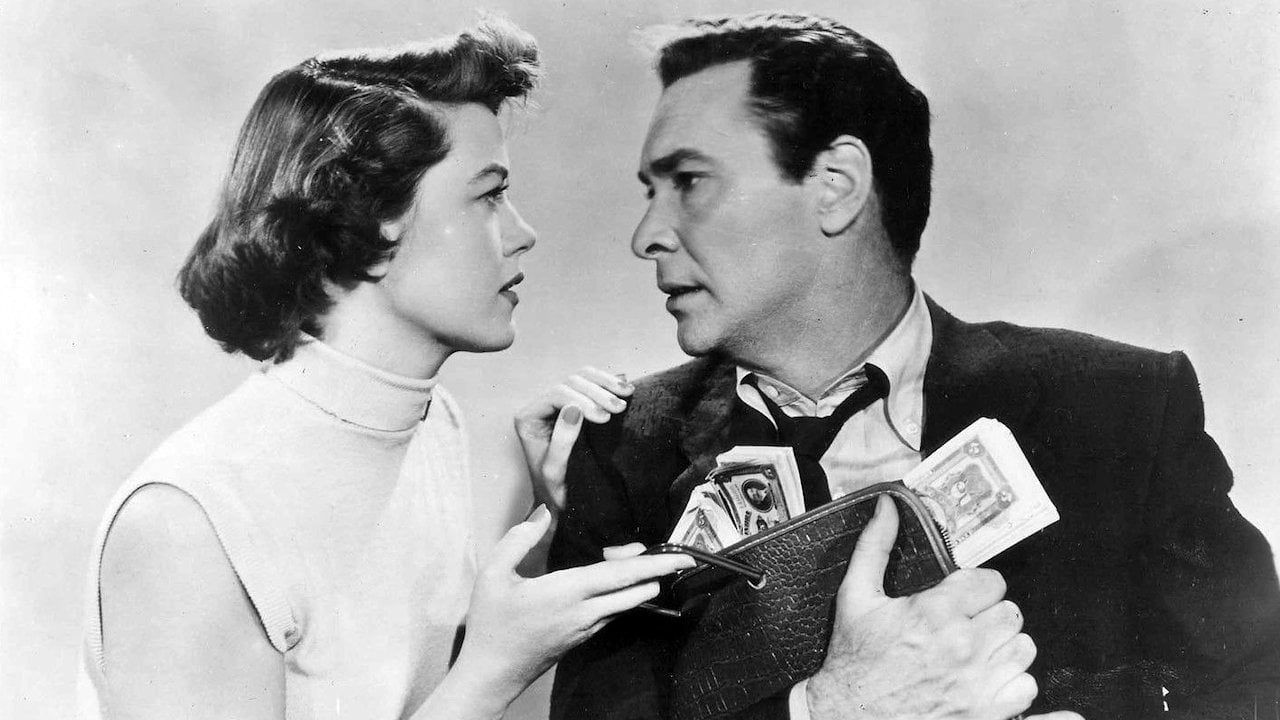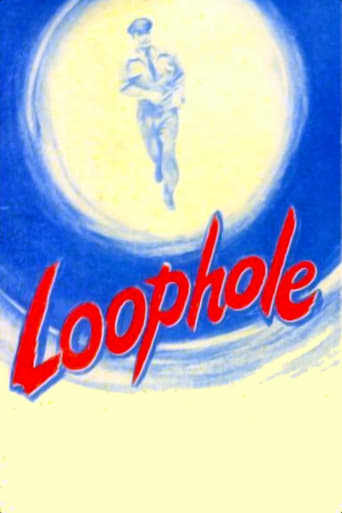Matialth
Good concept, poorly executed.
Comwayon
A Disappointing Continuation
Whitech
It is not only a funny movie, but it allows a great amount of joy for anyone who watches it.
Patience Watson
One of those movie experiences that is so good it makes you realize you've been grading everything else on a curve.
mark.waltz
Barry Sullivan is the innocent dupe used by a fake bank auditor (Don Beddoe) in extorting a great deal of money from his till, and even though his boss believes he's innocent, the bank's insurance company isn't so sure. Charles McGraw is the ruthless detective following him all over L.A., even though one of McGraw's co-workers (Don Haggerty) is certain he's innocent. McGraw even goes out of his way to get Sullivan fired from every job he is hired for, that is until the cab company boss stands up for him and tells McGraw to get lost. What does McGraw have against him? He even tries to bribe Sullivan into confessing, but since the audience knows that he's innocent, they are on Sullivan's side.Haggerty's days however are seriously numbered as his much younger floozy girlfriend (Mary Beth Hughes in a great femme fatal role) gets more agitated as Haggerty gets more nervous and guilt-ridden, especially when Sullivan spots him waiting on his own wife (Dorothy Malone) who has stood by Sullivan attesting to his innocence. The showdown is inevitable, and I for one couldn't wait to see Hughes get taken down and McGraw eat crow when he realizes that the man he's been stalking has been taken for a ride.This fantastic later film noir released by Allied Artists (formerly Monogram who released some great film noir in the early days of the genre) grabs you from the start and never lets go. Film Noir is a genre where the fans are as passionate about individual titles as they are in arguing over which titles should be included in the list of noir as they are about those which shouldn't. That argument, however, isn't going to happen here. This has all the elements of what makes the picture perfect film noir: an innocent man trapped into a situation he can't get out of, a guilty party suffering from fear and his own sins, the good girl who stands by one of the innocent parties, and the vixen who uses sex to get what she wants. Hughes makes it clear to Haggerty that unless they have all the money he embezzled, she's through with him, and like Stanwyck in "Double Indemnity", it's straight down the line with her until the gun shot rings out. As for McGraw, wait and see how he eats the crow. It's ironic, almost disgusting, but funny because well, that's life.
bkoganbing
If Loophole had starred a well known actor like Robert Mitchum this film would be better known. But Barry Sullivan good actor that he was never made it to the top tier. As it is it does have Dorothy Malone as Sullivan's loyal supportive wife, but this was two years away from Malone's Oscar performance in Written On The Wind which vaulted her career into the big time.In fact had Malone already made Written On The Wind she would have gotten the part that Mary Beth Hughes had as the hard hearted dame who drives Don Beddoe into a life of crime.I have to say that Beddoe and Hughes had one brilliant scheme for embezzlement. They take $50,000.00 from the bank where Sullivan works as a teller and suspicion falls on him. The whole movie is Sullivan trying to clear himself of suspicion.He's in fact initially questioned by the police and FBI and let go for lack of evidence. But the insurance investigator Charles McGraw stays doggedly and Javert like on his trail. Sometimes Javerts have their uses, but only when they're right. McGraw is dead wrong and won't back off. He keeps hounding Sullivan hoping he'll lead him to the money that he doesn't have. Beddoe is another interesting character. It's like they borrowed Alec Guinness's character from The Lavendar Hill Mob and used it here in a serious vein. He's this mild mannered teller who gets seduced by Mary Beth Hughes and then embezzles the money. Just a man thinking with his male member getting a taste of a sexy dame way out of his league.It's Hughes however that really dominates this film. One of her best bad girl roles. But she's definitely one you might risk imprisonment for a little nookie.Sullivan's a true tragic figure who fortunately had a couple of people believing in him. He's not arrested but he loses his teller job and then McGraw keeps on his trail getting him fired from every job he gets. I've known law enforcement people like that, won't explore other alternatives to a theory of a crime. I've known people who've suffered because of it.Loophole is quite the sleeper noir film. Definitely do not miss this if it is broadcast.
Martin Teller
A bank teller comes up $50,000 short and an investigator is determined to nail him for theft. The film is something of a mixed bag. The cinematography is pedestrian, the narration is hokey, and the ending is too neat to be satisfying. However, a story about someone being wrongfully accused always makes my blood boil in a way that holds my attention. Barry Sullivan is great as usual, but more interesting is Charles McGraw. McGraw usually plays a righteous character, but here he's such a relentless, contemptible bastard that you can't wait to see him get what's coming to him. The film could have paid off a little better in this respect, but it's an engaging performance. Dorothy Malone is unfortunately saddled with a dull good girl role that doesn't exploit her talents, but there is a small but delightful femme fatale part for Mary Beth Hughes. Ultimately the positives outweigh the negatives and it's a fun watch.
bmacv
As Jean Valjean had his implacable persecutor in Inspector Javert, so Barry Sullivan finds his in Charles McGraw. The setting, however, is not Europe's great capital Paris but Los Angeles, that post-war cynosure of middle-class dreams where orange groves and jobs in the aerospace industry beckon.Working contentedly at his wicket in a staid savings-and-loan office, Sullivan has the misfortune to be on duty during a robbery. It's not hoodlums in masks waving guns, but a visit by a bevy of bank examiners come to check that everything's on the up-and-up. Trouble is, there's one more of them than there ought rightly to be, and while a platinumed moll (Mary Beth Hughes) diverts Sullivan, the phony inspector (Don Beddoes) coolly lifts $49,900 from the till. Counting his cash over and over, Sullivan can't believe that he's so much short. So instead of reporting the shortfall, he goes home.Home is the cozy little bungalow he shares with wife Dorothy Malone, who can't believe that her straight-arrow of a husband didn't report it, either. Promptly on Monday morning he does so, and all seems to looking good until the bank's bonding company is informed. Though most of the staff come to think Sullivan's telling the truth, one of them, McGraw (an ex-cop who "resigned" from the force) issues a no-appeal "guilty" verdict and makes it his private and personal mission to hound Sullivan 'till he fesses up. Fired from job after menial job thanks to McGraw's vendetta, forced to sell the bungalow and relocate to a cramped apartment, Sullivan finally realizes it's up to him to clear his own name....Loophole's an unusual movie in that its all but exclusive focus is on the unjust persecution of a plainly innocent man (in this sense foreshadowing Alfred Hitchcock's The Wrong Man by a couple of years). It's tense and economical, if Beddoes and Sullivan do pass one another like ships in the night rather too often, in scenes closer in spirit to farce than suspense (and if the action-packed ending leaves a loose end or two). But the dark star of Loophole is McGraw, gleefully playing as despicable a character as he ever played in the noir cycle – and that's saying something.

